| Srl | Item |
| 1 |
ID:
139212
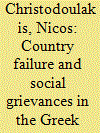

|
|
|
|
|
| Summary/Abstract |
The Civil War that took place in Greece between the Communist Party and the Centre-Right Government during 1946–1949 is examined from a political economy perspective. The cost of the conflict is measured as output forgone relative to what it would have prevailed had Greece followed a post-war recovery similar to that of other nations in Western Europe. A two-stage approach compares Nazi-occupied countries with neutral ones to assess the cost inflicted by Second World War, and then compares Greece with the former to estimate the impact of the civil conflict. A regional analysis finds that the political discontent was mainly shaped by pre-war socio-economic grievances, rather than being affected by contemporaneous deprivation or driven by class structure as hardliners of both sides preferred to present in pushing for an all-out confrontation. The failure to settle political rivalries and thus prevent the conflict is also discussed.
|
|
|
|
|
|
|
|
|
|
|
|
|
|
|
|
| 2 |
ID:
139214
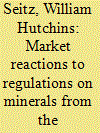

|
|
|
|
|
| Summary/Abstract |
Using an event study approach to analyze stock market data from the United States, I investigate how regulations on conflict minerals sourced in the Democratic Republic of the Congo were perceived by investors. I find that for a subset of mining companies, stock returns were abnormally high when regulations in the US became more likely. I also find that returns were higher for communications equipment manufacturing companies when strong regulations in the DRC were announced. I argue that these responses were due to the competitive environments faced by each of these company types. These findings relate to debates surrounding the effects of the conflict mineral regulations. While some critics argue that reporting requirements were tantamount to a ban on minerals from the DRC, I find that stock returns for a subset of companies were sensitive to legislation in the DRC after legislation became law in the US, suggesting that market participants did not expect a complete trade ban on regulated mining and trading activities.
|
|
|
|
|
|
|
|
|
|
|
|
|
|
|
|
| 3 |
ID:
139213
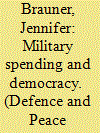

|
|
|
|
|
| Summary/Abstract |
This paper examines empirically whether democracies allocate fewer resources to the military than dictatorships. It employs a panel of up to 112 countries over the period 1960–2000 to estimate a standard demand for military spending model. While papers on the determinants of military spending generally include democracy as a control variable, with a few exceptions, it is not the focus of their enquiry. This paper addresses resulting problems in the existing literature concerning data quality and the appropriate measurement of key variables, as well as the question of causality between military spending and democracy. It finds that democracies spend less on the military as a percentage of GDP than autocracies do and that causality runs from regime type to military spending.
|
|
|
|
|
|
|
|
|
|
|
|
|
|
|
|
| 4 |
ID:
139215
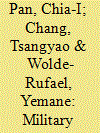

|
|
|
|
|
| Summary/Abstract |
This study revisits the causal relationship between military spending and economic growth in 10 Middle East countries via a panel causality analysis that accounts for cross-sectional dependence and heterogeneity across countries. Our results indicate unidirectional causality from military spending to growth for Turkey; one-way causality from economic growth to military spending for Egypt, Kuwait, Lebanon, and Syria; bidirectional causality for Israel; and no causality in either direction for Jordan, Oman, and Saudi Arabia. The empirical evidence does not provide consistent results regarding the causal relationship between defense expenditure and economic growth in these countries.
|
|
|
|
|
|
|
|
|
|
|
|
|
|
|
|
| 5 |
ID:
139216
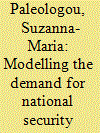

|
|
|
|
|
| Summary/Abstract |
In the past, national security for the majority of countries was almost exclusively associated with an external military threat emanating from a rival state(s). This was reflected in the standard models for the demand for military expenditure. The emergence of new security challenges such as terrorism, transnational crime networks, failed and rogue states, has profoundly affected the international security environment and the concept of national security. This note develops a model for the demand for national security expenditure adopting a broader, more inclusive definition of national security and includes concomitant budgetary outlets to meet the new security challenges.
|
|
|
|
|
|
|
|
|
|
|
|
|
|
|
|
| 6 |
ID:
139211
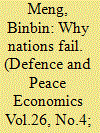

|
|
|
|
|
| Summary/Abstract |
Both the increasing defense spending and the widening divergence between rich and poor countries are of great concerns. This paper attempts to explain the two concepts in a unify theory framework. In the view of conflict economics, a nation’s defense spending can be seen as the fighting commitment of distributive effort in the global economy while other is the productive effort. The development of global economy needs the productive efforts from almost every nation, and the distribution of the aggregate output is determined in large degree by the fighting commitment of each nation. The numerical simulation of the model gives a reasonable explanation of the patterns of the divergence/convergence of prosperity-poverty gap between nations, the fact which is evidenced by many empirical analyses. (1) Given the initial wealth ratio between nations fixed, there is a critical value of fighting decisiveness, when the actual value is larger than the critical value, it is more likely to result in Matthew effect; otherwise the gap would gradually be shortened. (2) Given the fighting decisiveness fixed, there is a critical value of initial wealth ratio, when the actual value is larger than the critical value, it is more likely to result in Matthew effect; otherwise, the gap would gradually be shortened. The study gives a new perspective to explain and handle the increasingly defense spending and the prosperity-poverty gap between nations.
|
|
|
|
|
|
|
|
|
|
|
|
|
|
|
|